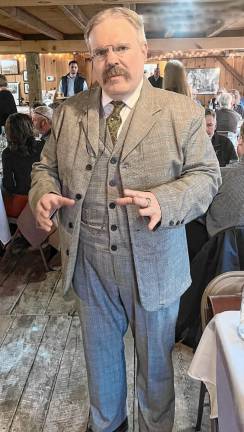
It’s true that we all have favorite people. These are individuals to whom we have been introduced during our lives who have acted as someone we might emulate.
If we are attracted to them, they might act for us as role models. As time goes on, they may be guideposts on the steppingstones that make up our journey through life.
One of these role models, for me, is Theodore Roosevelt Jr.
I read about him in school. I followed this up by getting books out of the school library to find out more.
When going through an old spare closet in our house when I was but a child, I found what were likely to be my great-grandfather William Garrity’s artifacts.
William Garrity was born in the 1880s and died in the mid-1930s so I never met him. For me, going through these old boxes was of utmost mystique to me. They included thick one-sided records, many of which were of the operatic lyric tenor singer Caruso, the great Enrico Caruso from the 1910s.
Along with books that included youthful characters like Ned and Jill and a little red schoolhouse, there were a lot of photos. Some of these were wonderful finds from the Centennial Exhibition (in Philadelphia in 1876) and the World’s Columbian Exhibition (the first world’s fair in Chicago in 1893), along with a stereoscope and those dual photo cards that fit into the stereoscope to provide a thrilling 3-D view.
There were other photos of family and our mining town. Among these photos was one of Theodore Roosevelt’s visit to Newton, Sussex County.
I found it astounding that a president visited our little county, but he did. Speaking of emulating people, my impression of Sussex County, in a broad-brush view over the centuries, is that we have had and maintained a hearty lust for freedom and self-governance; a sense of action orientation and of self-reliance to the character of the populace.
The visit and remembrance of Teddy Roosevelt is one example. Another is the apparent fondness for Andrew Jackson in the early 1800s.
Recently, the Sussex County Historical Society’s Wayne McCabe hosted a dinner that had a Teddy Roosevelt re-enactor. The person did an excellent job of impersonating the great Rough Rider.
As soon as I came in, I knew who he was supposed to be. He was very informed about Teddy and always spoke in the sense that “he was him.”
Theodore Roosevelt (1858-1919) was a true polymath. Not only was he a man of a wide breadth of skills, but he was also outstanding in many of them.
As a child, he had debilitating asthma. His mother and his first wife died on the same night. But he had a thirst for knowledge, and he aspired to “the strenuous lifestyle.”
He was a lifelong naturalist and created his own museum as a youth with a keen interest in insects and birds and making drawings. He wrote books on nature and on naval warfare.
He became a cowboy out West and joined the Rough Riders in the Spanish-American War. He was a governor of New York, vice president and became the youngest U.S. president. He also was a Nobel Peace Prize winner.
The TR re-enactor did a fabulous job of “being” Teddy, and he reignited the interest in an American great person.
Teddy was an American politician, statesman, conservationist, naturalist and writer.
Here are two quotes from Teddy Roosevelt that are favorites of mine:
“... The credit belongs to the man who is actually in the arena, whose face is marred by dust and sweat and blood, who strives valiantly, who errs and comes up short again and again, because there is no effort without error or shortcoming, but who knows the great enthusiasms, the great devotions, who spends himself in a worthy cause; who, at the best, knows, in the end, the triumph of high achievement, and who, at the worst, if he fails, at least he fails while daring greatly, so that his place shall never be with those cold and timid souls who knew neither victory nor defeat.”
and
“Do what you can, with what you have, where you are.”
Bill Truran, Sussex County’s historian, may be contacted at billt1425@gmail.com